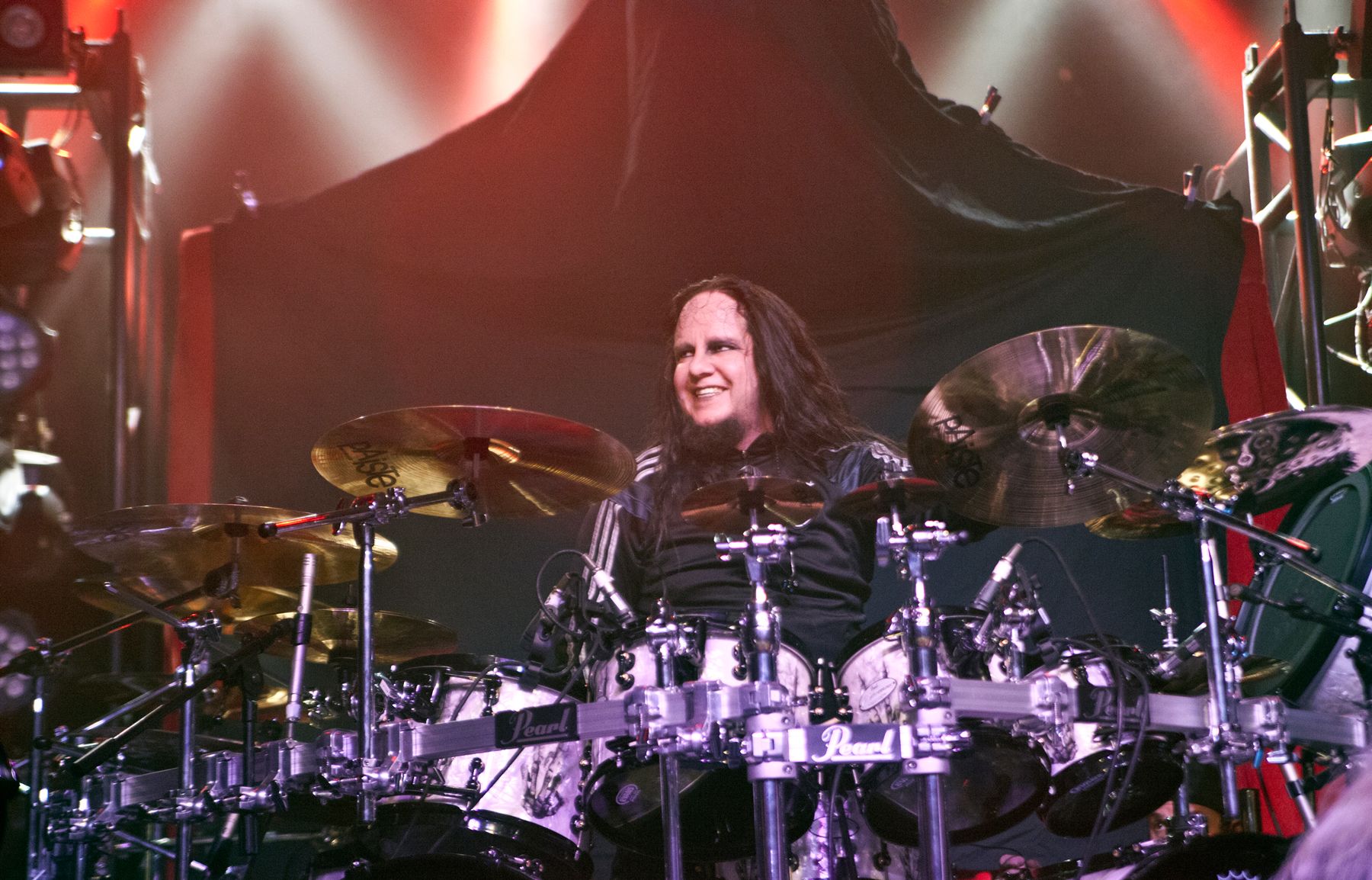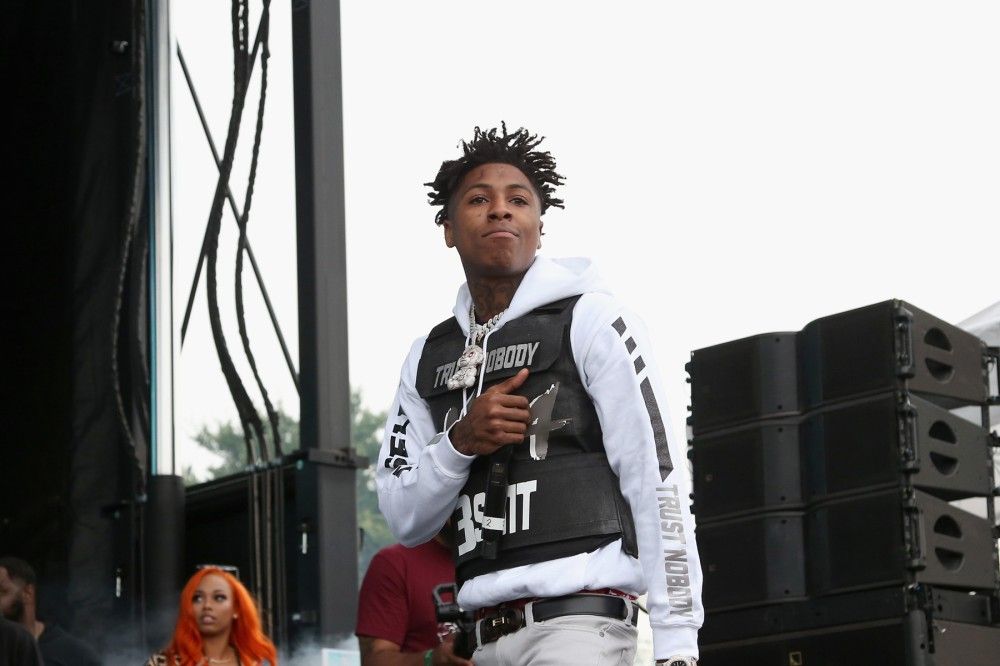
Joey Jordison, Founding Slipknot Drummer, Dead at 46
Joey Jordison, Slipknot’s founding drummer and co-writer of many of their biggest hits, died on Monday at the age of 46. A rep for his family said he died “peacefully in his sleep” but did not specify a cause of death.
“Joey’s death has left us with empty hearts and feelings of indescribable sorrow,” reads a statement from Jordison’s family. “To those that knew Joey, understood his quick wit, his gentle personality, giant heart, and his love for all things family and music. The family of Joey have asked that friends, fans, and media understandably respect our need for privacy and peace at this incredibly difficult time.” The family intends to hold a private funeral service.
Jordison was the motor that kept Slipknot’s music running in their early days. His stoic presence behind the drum kit and virtuosic drum solos, like the one captured in the band’s Disasterpieces film where his riser ascended to the heavens, made him a favorite member for fans. Behind the scenes, Jordison was instrumental to Slipknot’s songwriting, and his neck-rattling rhythms and death-metal blastbeats were a crucial ingredient to the band’s sudden success.
The drummer was playing with a group of Des Moines, Iowa metalheads who called themselves the Pale Ones and later Meld when he suggested they change their name to Slipknot in 1995. Within a few years, the band’s lineup expanded to nine members who wore nightmarish masks and fused metal and rap aggression that placed them at the vanguard of the nu-metal explosion. Thanks to steady touring and explosive live shows on Ozzfest, their 1999 self-titled debut went double-platinum.
He stayed with the band until 2013, leaving for what he described at the time as “personal reasons.” A few years later, he revealed a neurological disease that caused his departure. “I got really, really sick with a horrible disease called transverse myelitis; I lost my legs,” he told the audience at the Metal Hammer Golden Gods Awards in 2016 (via NME). “I couldn’t play anymore. It was a form of multiple sclerosis, which I wouldn’t wish on my worst enemy. I got myself back up, and I got myself in the gym and I got myself back in fucking therapy to fucking beat this shit.” At the time, he said he was rededicating himself to music with a new band called Vimic.
In addition to Slipknot and Vimic, the prolific musician played guitar in the glam-inspired horror-punk group the Murderdolls, drums with the alt-metal group Scar the Martyr and extreme-metal supergroup Sinsaenum, and pre-Slipknot resume stints in Modifidious and the Have Nots. He also made guest appearances on recordings by Otep, Necrophagia, and Rob Zombie. In 2005, he assembled several supergroups for the project Roadrunner United, which commemorated the 25th anniversary of Slipknot’s label, Roadrunner; on five tracks, he played with dream teams that featured members of Type O Negative, Deicide, Life of Agony, and King Diamond’s band.
Nathan Jonas Jordison was born in Des Moines on April 26th, 1975. He grew up nearby in the small town of Waukee, where he got bad grades in school and considered himself an introvert. He discovered Kiss and Black Sabbath in the early Eighties and his parents nurtured his interests in music. He started his first band while in elementary school; Jordison played guitar with a friend who wasn’t very good at drums, prompting the musician to switch instruments. His parents surprised him with his own drum kit when he was in fifth grade and he continued to play with friends.
Jordison and the other original members of Slipknot found each other playing Des Moines’ club circuit, chiefly at a venue called the Runway. By 1996, they had started wearing masks and had put out a demo album called Mate. Feed. Kill. Repeat., which featured a song called “Slipknot” that the band later refashioned into the Slipknot album’s “(sic).” “The first mask I had was an original pale-white kabuki mask,” Jordison told Revolver. “One Halloween, when I was about eight years old, I came home from school and my mother popped around the corner with that mask on and a long robe and scared the living fuck out of me. It’s always stuck with me. So I had to use that for my mask.”
Slipknot’s self-titled debut came out in 1999 and thanks to a slot on Ozzfest and videos for the singles “Wait and Bleed” and “Spit It Out,” it was certified platinum within a year. “I was a night manager at a Sinclair gas station from ’95 to ’97,” Jordison told Rolling Stone in 2001. “That’s where most of Slipknot was conceived. I’d get off band practice at about ten, and I’d bring a radio and TV and fucking crank metal. [Member] Shawn [Crahan] would come down at about 11:30, and we’d start plotting things out. He’d split at about five in the morning, and we’d have all these ideas. That’s how we did it.”
Their second album — 2001’s Iowa — was an even bigger success, reaching Number Three on the Billboard 200 as the band moved from Ozzfest’s second stage to main-stage headliners. But not everything was so sunny behind the scenes. “When we did Iowa, it was a very dark time for the band,” Jordison told Revolver. “Some of our strongest and most meaningful songs are on that record, but we were all on drugs and drunk and it sucked. It’s a time I don’t like to talk about much because I don’t like to condone any drug use, whatsoever.” Vol. 3: (The Subliminal Verses), released in 2004, debuted at Number Two, while 2008’s All Hope Is Gone bowed at Number One. That record would be Jordison’s last with the band.
In 2016, the drummer claimed the band had fired him via email three years earlier over a misunderstanding. “They got confused about my health issues and obviously even I didn’t know what it was at first,” he told Metal Hammer. “They thought I was fucked up on drugs, which I wasn’t at all. I’ve been through so many things with those guys, and I love them very much. What’s hurtful is the way it went down was not fucking right.”
A few years before his death, Jordison revealed that he was holding onto demo tapes of songs he’d written for Slipknot at the time of his dismissal. “Maybe someday they’ll surface, maybe they’ll never be heard, but I don’t translate them to any other band. They still stay in the Slipknot safe,” he told Metal Hammer. “I won’t use them for anyone else besides Slipknot, if that ever happens again.”
Twenty years ago, though, he was unsure if Slipknot could continue — he just knew he wanted it to. “I don’t think this band can last more than four or five albums,” he told Rolling Stone. “Look what we’ve done on the new one [Iowa]. I know we’ve succeeded every time I listen to it. I think four albums will tie everything together. This band is so physical, it’s literally trimming years off our lives. This music is hard to play, and it’s hard on us. But we love it.”



